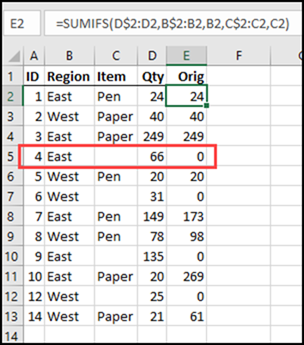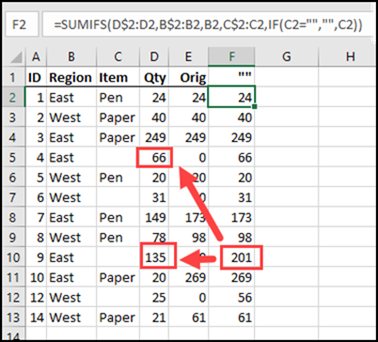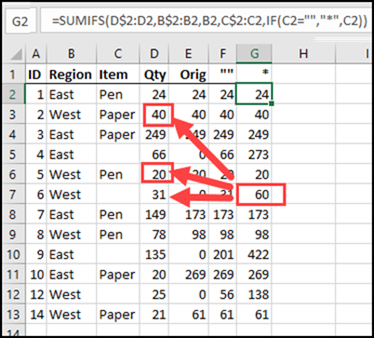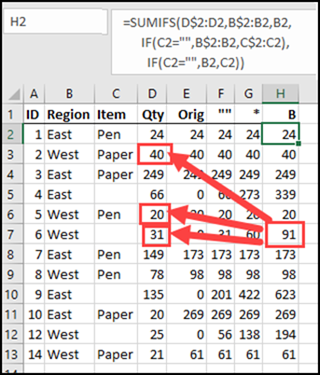I not long ago figured out about The 100-Working day Task (#The100DayProject), in which you operate on generating a thing each day, for 100 times. Would Excel formulation (#100DaysOfXL) be regarded as an creative project? Maybe not, but I had pleasurable operating on this SUMIFS method with vacant standards cells!
SUMIFS Components With Vacant Criteria
Someone emailed to ask how they could dismiss one particular criterion in a SUMIFS formula, if that cell is empty. Listed here is the first formulation:
=SUMIFS(D$2:D2,B$2:B2,B2,C$2:C2,C2)
It sums all the values in column D, starting up in row 2, and down to the latest row, where:
- values in column B match B in the the recent row,
- and values in column C match C in the the present row
See much more SUMIFS examples on the Sum Cells web page of my Contextures web site.
Ignore Cell If Blank
How can we adjust the method, so it ignores the criterion for C, if the present-day row has an vacant cell in column C?
1st, I set up a sample sheet, exactly where I could do a bit of experimenting, and entered the authentic system in column E
It is attention-grabbing that SUMIFS returns a zero if there is an vacant cell in column C.
Attempt an Vacant String
For my initial alternative, I tried out working with an empty string as the criterion, if C was empty.
=SUMIFS(D$2:D2,B$2:B2,B2,C$2:C2,IF(C2=””,””,C2))
That made totals in the rows with blank cells, but it only additional up the other blanks.
Check out a Wildcard
Upcoming, I tried out using an asterisk wildcard as the criterion, if C was vacant.
=SUMIFS(D$2:D2,B$2:B2,B2,C$2:C2,IF(C2=””,”*”,C2))
That established totals in the rows with blank cells, but it did not consist of the values from blank cells. Apparently the wildcard won’t acknowledge individuals.
Repeat for the Get
Lastly, I made a decision to repeat the initial standards vary and its criterion, if C was empty:
=SUMIFS(D$2:D2,B$2:B2,B2, IF(C2=””,B$2:B2,C$2:C2), IF(C2=””,B2,C2))
And that labored! As you can see in the display screen shot down below, it summed all the previous things that fulfilled the column B criterion, and also integrated the rows in which C is empty.
Perfectly, that was fun – even if it really is not artsy more than enough to put up on Instagram!
Other SUMIFS System With Empty Criteria Options
There are possibly other strategies to address this SUMIFS difficulty, so if you would use something various, allow me know in the comments.
___________________________




No comments:
Post a Comment